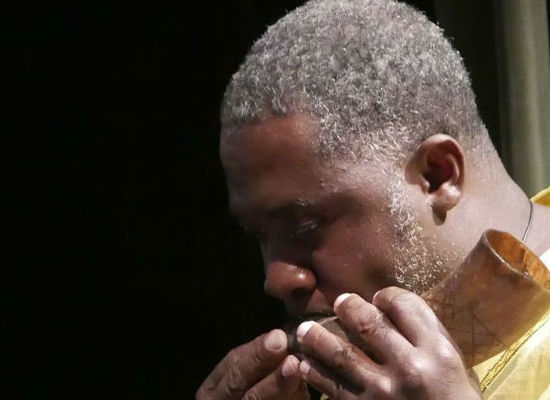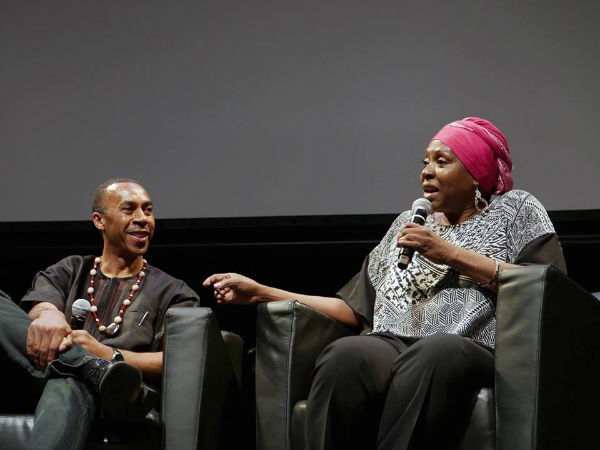Jamaican royalty visited Harlem recently. For one day only, “Queen Nanny – Legendary Warrior Chieftainess” arrived in the village following a premiere screening at the United Nations the night previous.
Debuting at the Schomburg Center for Research in Black Culture, the documentary tracing the footsteps of the African woman who trounced British troops in the 18th century by outwitting them in the mountains of Jamaica attracted SRO crowds.
The film written and directed by Roy T. Anderson premiered at the United Nations on Oct. 19, the day the Caribbean island annually honors heroes and heroines that have impacted the lives of citizens. Named in tribute to seven distinguished individuals that have enabled independence from colonial rule, the day’s focus also distinguishes Nanny as the only female among them.
On the island, Nanny is a revered warrior, heroine and queen.
Outside of the island, little is known about the liberator who much like Harriet Tubman, a century later during the American Civil War, born into slavery, escaped and subsequently made more than 13 missions to rescue approximately 70 enslaved family and friends, using the network of antislavery activists and safe houses known as the Underground Railroad.
Much has been written about Tubman, however, filmmaker Anderson said while doing research for his film he was able to find only four books in the historical archives that documents Nanny’s amazing biography.
Apparently, much of the tales about Nanny have been passed down through oral history.
“Why would the British want to write a book about how an army of backward people led by a woman whipped the greatest army in the world.”
According to Maroons living in Jamaica, that kind of information would best be buried, erased and totally defied.
More than a few contend that suppression of Nanny’s feats was not beyond the capacity of the colonial enslavers.
Maroons were African refugees who escaped slavery and established free societies throughout the Americas. They are the proudest of Black Jamaicans. Maroons are also indigenous to Suriname, Cuba, Brazil, Haiti, the Dominican Republic and Puerto Rico.
History reveals that they eluded enslavement by escaping to the treacherous mountains. It was there in Jamaica, that Nanny, a freed Akan African from Ghana arrived in Jamaica, with entourage and helpers in order to see how her people fared after leaving the continent and away from the African village.
How she outwitted the red-coats using guerilla tactics is legend to folktales.
Stories about British soldiers reporting sightings of 10 feet tall trees that came alive and swallowed soldiers were prevalent.
Maroons now laugh off the phenomena to explain that Nanny tricked her trackers by layering her army with camouflage. In a re-enactment, the film shows men covered in branches and shrubbery to disguise from the enemy. Scenes depict troops maneuvering the hazardous course, unaware of traps Nanny set for them to fall into, and how her army surprised the British troops wearing tree branches.
Another retold tale is that she skillfully caught bullets aimed at killing her men.
“If anyone can believe that a man (Moses) parted the seas…then, why not Nanny snatching bullets from mid-air?”
Legend has it that the Ghana, Africa-born, Akan chief was able to do just that.
The fact Nanny was able to communicate with her army using an abeng (horn from cow) to sound calls and commands proved a useful strategy disadvantageous to the British cause.
“The abeng was like our cell phone,” a maroon joked in the film.
But it was no joke that Nanny stayed in constant communication with her army.
Also explained in the film is that in the Akan tradition, Nanny defines “any chief who is female.”
Throughout the 59-minute document, reenactment of the route Nanny might have traversed through the treacherous mountains featured Gloria Simms, a real, live maroon queen who relived the ancestral heroine, Queen Nanny.
Much of the spirit of Nanny was emphasized and amplified by a number of women, among them: Jamaican, Olympian, Shelley Fraser-Pryce, the fastest woman on earth; Dr. Afua Cooper, a professor, author and poet who reside in Canada and specialize in African-Canadian history, Rita Marley, singer popularly known as the Queen of Reggae and Member of Parliament Olivia “Babsy” Grange, who on Oct. 19, received one of Jamaica’s heroes’ day honor.
Also presented to voice the effect Nanny has had on the population were: Sarah Manley, granddaughter of national hero Norman W. Manley, Portia Simpson Miller, the island’s first female prime minister as well as numerous historians and educators that specialize in African history.
After the screening, former City College Prof. Leonard Jeffries, joined Jamaicans, maroons from numerous Caribbean islands, the filmmaker, as well as spokesperson associated with the production of the telling history to discuss the merits of its production.
Also present at the Schomburg were Simms — who portrayed Queen Nanny; Cooper, chairman of African Diaspora studies in Toronto, Canada and choreographer/dancer Camille Yarbrough.
From all indications, the story of Jamaica’s Nanny has not been fully told and despite the fact a number of sources were interviewed the “person of universal value,” Anderson described as “Queen Nanny – Legendary Maroon Chieftainess” is yet to be fully explained.
The film will premiere in Jamaica on Oct. 23 at the University of the West Indies. The following evening a Maroon Town audience in Portland, Jamaica will be able to view the documentary on the only, female, military commander to defeat the British army.
Photos by Bob Gore from Schomburg FB page
Maroon Town maroon Joel Bernard blows abeng
Gloria Simms, aka Mama G, a maroon queen who portrays Queen Nanny in documentary with filmmaker Roy T. Anderson.
Dr. Afua Cooper, Canadian dub poet and chair of African studies at Dalhousie University.
Become a Harlem Insider!
By submitting this form, you are consenting to receive marketing emails from: . You can revoke your consent to receive emails at any time by using the SafeUnsubscribe® link, found at the bottom of every email. Emails are serviced by Constant Contact












